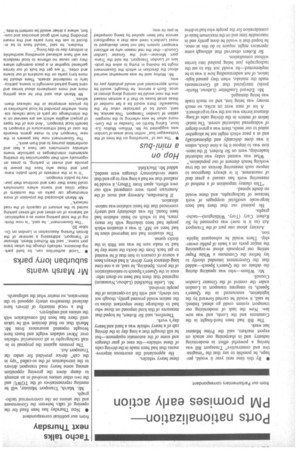Ports nationalization- PM promises early action
Page 34

If you've noticed an error in this article please click here to report it so we can fix it.
from our Parliamentary correspondent
• By this time next year it would, perhaps, be possible to say that the "imaginative and constructive" Transport Bill was having a powerful effect in modernizing industry and in sharpening our attack on export markets, said the Prime Minister last week.
The Bill had been hard-fought in the Commons and the Lords, and was now law. Now the task of modernizing our transport system could go ahead. Indeed, he said, it would be carried forward by the legislation, announced in the Queen's ,Speech, to integrate transport in London under the control of the Greater London Council.
Mr. Wilson—who was speaking during the debate on the Queen's Speech—added that the Government intended shortly to lay before the Commons a White Paper setting out proposals about re-organizing the major ports on a basis of public ownership. There would be subsequent legislation.
Anxiety about one part of the Transport Act (as it is now) was expressed by Sir Robert Cary (Tory, Withington)—tachographs.
He pointed out that there had been large-scale unofficial stoppages of work because of tachographs, and these would no doubt spread.
"This clumsy imposition of a method of measuring work has caused a great deal of resentment. It is always dangerous to impose such measuring devices on the true working bench element of our population."
What was wanted today was industrial leadership, went on Sir Robert. If the intention was to impose it by a time clock, unless it was done delicateh and diplomatically and at a pace which might not be altogether suited to our needs, there was a grave danger of widespread industrial unrest. The installation of meters in the driving cabs of longdistance lorries was not the way to go about it.
A lot of men were on strike, so much money was being lost, and so much trade was being damaged.
Mr. Edward Leadbitter (Labour, Hartlepools) interjected that all Governments made the mistake, when they passed legislation, of not understanding how it was to he implemented—he would not like to see the tachographs just being pushed into lorries without consultation.
Sir Robert observed that although some operators might require to do this at once, he hoped that it would be done gently and in 'reasonable time and on the maximum basis of consideration for the people who had to drive these heavy vehicles.
He appreciated the enormous improvements that had been made in the driving cabs of these vehicles—the ease of gear changes and some of the automatic equipment—but he still thought that a long day in the driving cab of a heavy vehicle was a hard and heavy day's work.
Therefore, said Sir Robert, he hoped that measures of this kind imposed on those who had to discharge these important duties to the nation would proceed gently, though not too slowly, and with full co-operation of the people involved.
Mr. Leslie Huckfield (Labour, Nuneaton) regretted that there had been no direct refer ence in the Queen's Speech to nationalization of the ports. Speaking, he said, as a one-time long-distance lorry driver, it had always been a source of concern to him that if he wanted to get back from the docks the same day he had to make sure he was not 98th in the docks queue.
The situation had not improved since he had been an MP. It was a situation which people had been tinkering with for many years, but to which no basic solution had been found. He was absolutely and utterly convinced that the basic solution was nationalization.
If Rotterdam, Antwerp and most of the American ports were compared with our own efforts, apart from Tilbury, it would be realized that we had a long way to go and that some , revolutionary changes were needed, added Mr. Huckfield.




























































































































































